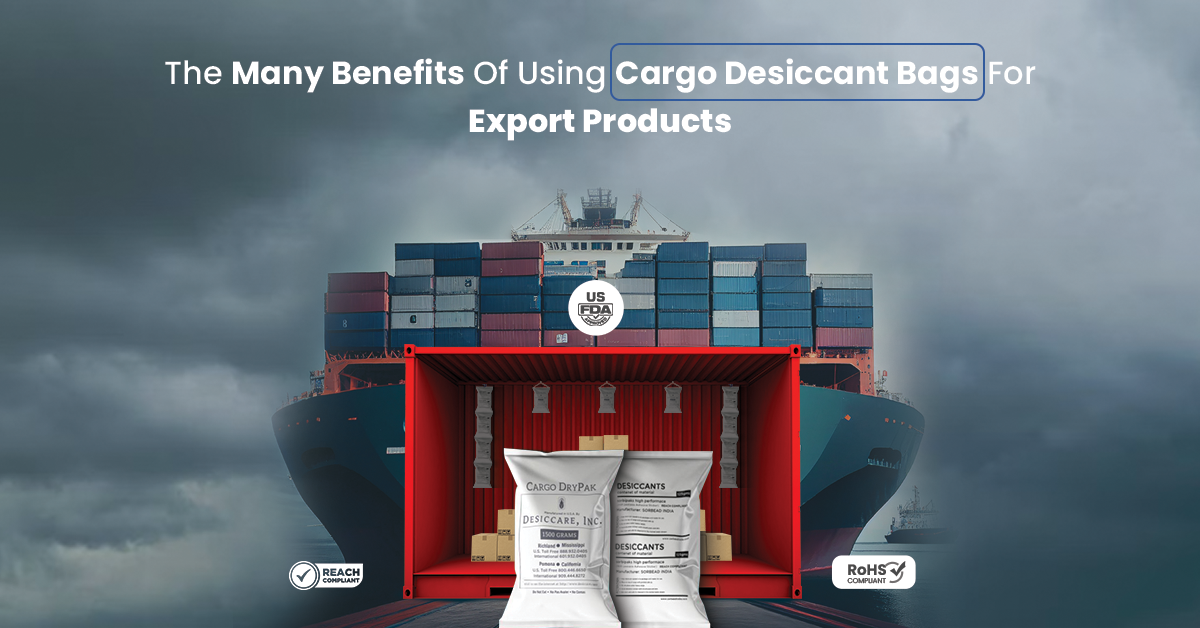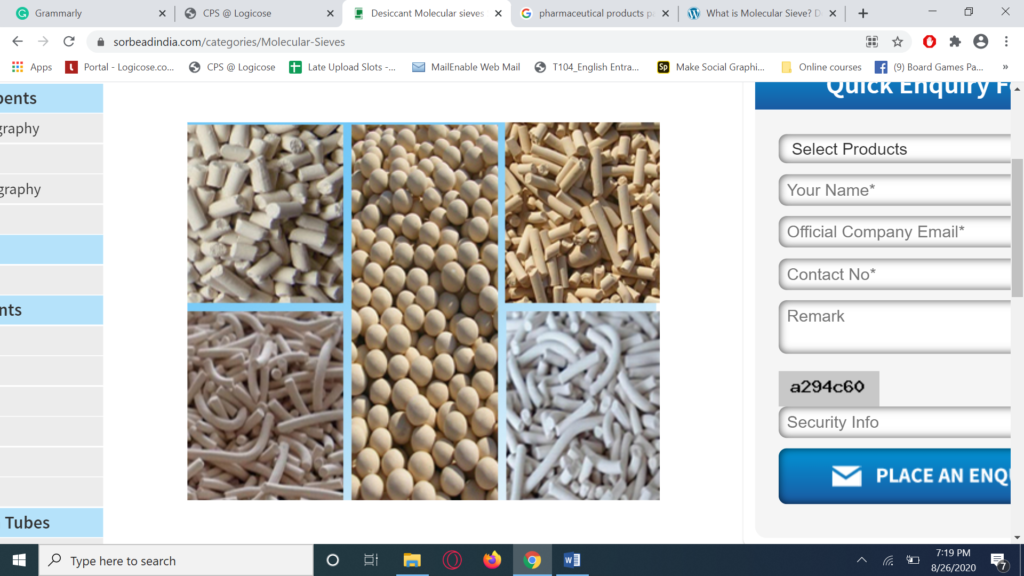Cargo Desiccant Bags For Export Products
When storing, packaging, and transporting export quality products effectively, in a cargo shipment setting, it is important to make sure that the optimal environmental conditions are maintained inside the cargo. Desiccants play an important role in export shipments. They help protect goods from moisture damage, maintain product quality, prevent corrosion, and prevent the growth of mold and mildew.
The use of cargo desiccant bags helps keep your goods dry and moisture-free, as when it comes to international shipping, there are many issues that need to be addressed like changing and varying moisture and humidity levels, contamination, growth of mold and mildew, etc.
One of the most important of these issues is moisture damage thus it is useful to add cargo desiccation bags for export products, as they are specially designed to adsorb moisture and keep your goods dry and moisture-free inside shipping containers.
These bags play an important role in protecting your goods from the harmful effects of moisture damage. Whether you’re exporting electronics, equipment, food, or pharmaceutical products, you can count on these bags to help keep your goods safe and dry. Desiccation bags help prevent the growth of rust and corrosion, as well as mold and mildew.
Benefits of using cargo desiccant bags for export products
Cargo desiccant bags mainly consist of a highly adsorbent material such as silica gel beads, activated clay, or molecular sieves, that help greatly with moisture control within the packaging, and transportation of exported goods via cargo.
The main purpose of desiccants is to control and decrease the amount of moisture present in the packaging as well as the surrounding air in the cargo setting. This reduces the risk of damage that can be caused by moisture, condensation, or temperature changes which is very common in a container setting. By maintaining optimum moisture conditions, they ensure that products arrive at their destinations in their best effective condition.
- The main reason for rust and corrosion is moisture and condensation formation in the cargo. Moisture can corrode metal parts and essential delicate machinery. The cargo desiccant bag works by trapping moisture in the air and preventing it from reaching metal surfaces and thus rusting. This is important for exporting quality goods that are transported in containers where the temperature and humidity can vary and lead to this damage.
- Mold thrives and grows in extreme and changing humid conditions and can cause a lot of damage to numerous organic products like food products, textiles, and wood furniture. Cargo desiccant packs prevent the growth of mold and mildew preventing spoilage of your export products and ensuring that your products arrive in perfect condition.
- Cargo desiccant silica bags are essential for export products that have a short shelf life or are susceptible to spoilage and damage due to changing environmental conditions that are common in cargo containers. By regulating the existing moisture levels, cargo dry bags help to extend the shelf life of perishable and delicate products, allowing them to reach the consumer in perfect and efficient working conditions.
- Due to varying moisture changes in a cargo container, the export goods can suffer from deterioration, warping, discoloration, and product spoilage, thus these desiccant bags can help maintain a low humidity level in the shipping container, and help protect products that are sensitive to moisture, such as electronics, pharmaceuticals, and paper products.
Usage guidelines when using cargo desiccant bags in export containers
Type of cargo desiccant bags
Cargo desiccant bags come in a variety of shapes and sizes, so it’s important to find the right one for your needs before you begin using them for your particular cargo container and export product that you are shipping.
– Silica gel desiccant bags are the most common type and widely used variety of desiccant bags. They are effective at absorbing moisture from the air and are relatively inexpensive.
– Clay desiccant bags are another popular type of desiccant bag, and are more effective at absorbing moisture than silica gel bags, but they are also slightly expensive when compared to them.
– The molecular sieve type desiccant bag, uses its high adsorption properties to efficiently absorb and retain moisture, ensuring the safe and dry transit of sensitive goods, and other export products.
The quantity of desiccant bags for your cargo, will depend on the size of the container, the type of cargo, and the expected humidity level. You can use one unit of desiccant per cubic foot of cargo space that you are using for storing your export products, which is a general rule.
Once you have placed the desiccant bags in the container, it is important to seal the container tightly. This airtight seal will prevent moisture from entering the container and help in prevailing the effects of the desiccant bags effectively during use in the cargo.
It is also important to monitor the desiccant bags frequently and periodically to make sure that they are still effective and not saturated. If the desiccant bags are saturated and no longer able to absorb moisture, they need to be replaced or regenerated to be effective.
If your cargo may frequently experience changes in humidity or moisture levels, it is advised to use more desiccant bags to help trap excess moisture. You can also use a barrier bag to protect the desiccant bags from moisture.
Once you’ve selected the right type of desiccant bags and determined the amount you need for your container size, you need to position them in the container in a specific way so that they can efficiently adsorb moisture and humidity. The best way to place your desiccant bags in the container is close to the walls where they can soak up moisture from the surrounding air in the cargo container.
Cargo desiccant bags for export products can help to protect your reputation by ensuring that your export products arrive in optimum and their best condition. Moisture-damaged products can hurt your overall reputation and may also lead to business losses, thus you should definitely consider using cargo desiccant bags to help to prevent this by protecting your products from moisture damage, ensuring that you deliver high-quality products to your customers.










